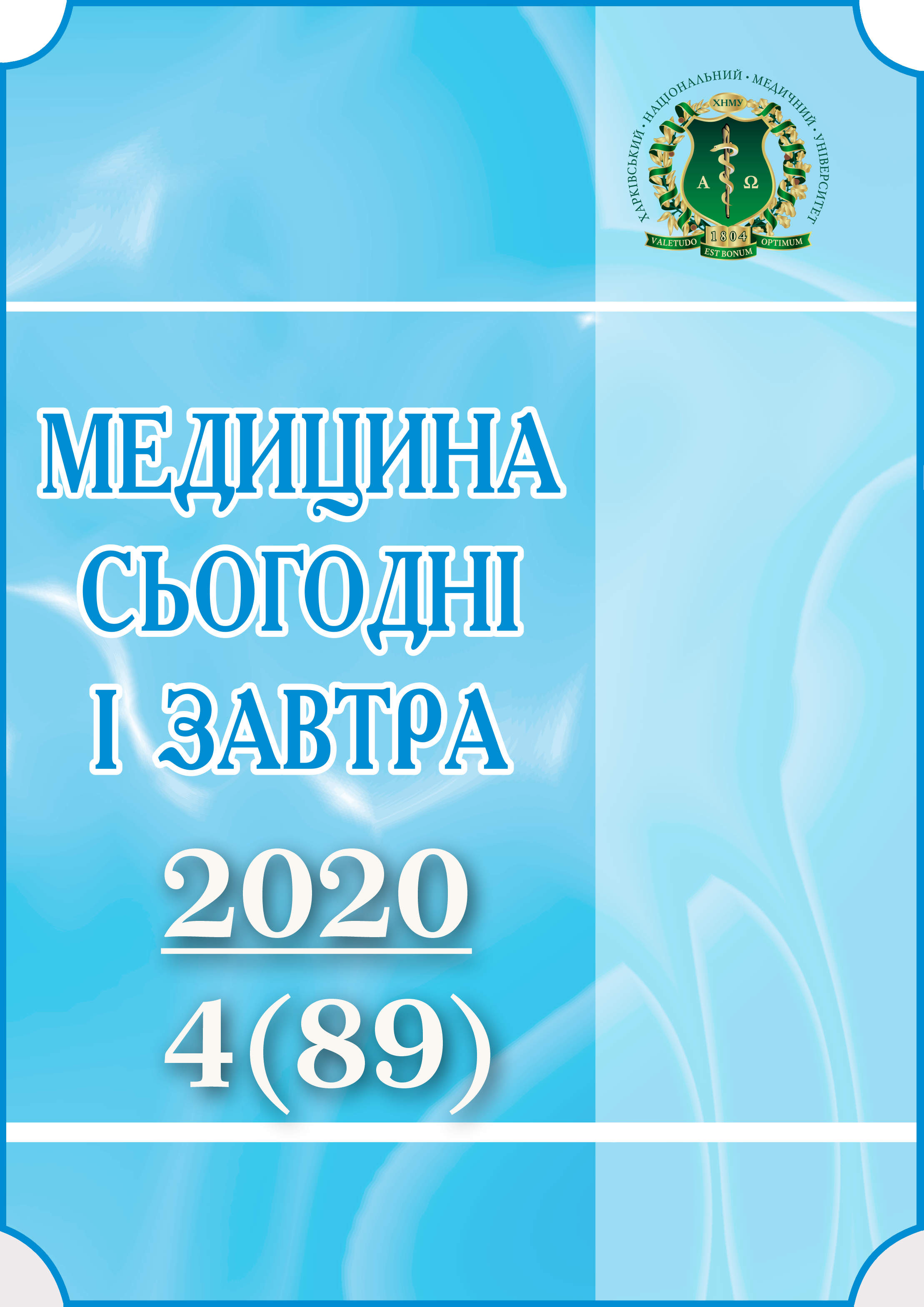Abstract
According to the UN, the victims of the armed conflict in Ukraine were 6,764 people (including civilians), 16,877 people were injured, and the number of temporarily internally displaced persons exceeded 2.3 million. As of January 1, 2020, there are 459,655 participants in hostilities in Ukraine. Due to today’s challenges, non-psychotic mental disorders are a serious problem in general and especially in military psychiatry. 115 servicemen of the Armed Forces of Ukraine who took a direct part in hostilities in the Anti-Terrorist Operation zone were surveyed. All subjects were divided into two groups. The main group included 60 combatants who had injury and non-psychotic mental disorders, the comparison group included 55 combatants with non-psychotic mental disorders who were not injured. It has been determined that in the structure of non-psychotic mental disorders in the examined patients there was a severe level of depression (at 89.1% and 79.2%) and anxiety (at 95.6% and 94.4%) by the Hamilton Scale, subclinical manifestations of depression (at 56.8% and 49.9%) and clinical manifestations of anxiety (at 69.8% and 66.5%) by a Hospital Anxiety and Depression Scale. The phenomenological structure of non-psychotic mental disorders in combatants who were injured is represented by the predominance of depressive, anxious, asthenic and psychosomatic syndrome.
Keywords: injuries, non-psychotic mental disorders, combatants, stress.
References
Maruta, N.A., & Zavorotnyi, V.I. (2018). Printsipy reabilitatsii voiennosluzhashchikh s razlichnymi variantami posttravmaticheskoho stressovoho rasstroistva [Rehabilitation principles for military personnel with different types of post-traumatic stress disorder], Ukrainskyi visnykpsykhonevrolohii - Ukrainian Bulletin of Psychoneurology, 26(3(96)), 33-38 [in russian].
Okhorona psykhichnoho zdorovia v umovakh viiny [Mental health care in war], (2017). (T. Semyhina, I. Pavlenko, Ye. Ovsiannikova et al, Trans.). (Vols. 1-2; Vol. 1). Kyiv: Nash format, 579 p. [in Ukrainian].
Kozhyna, H.M., Druz, O.V., Zelenska, K.O., & Chernenko, I.A. (2020). Suchasna model formuvannia poststresovykh rozladiv v uchasnykiv boiovykh dii [Modem model of formation for post-stress disorders among military service members and veterans]. Medytsyna sohodni і zavtra - Medicine Today and Tomorrow, 1(86), 39-45. DOI: 10.35339/msz.2020.86.01.05 [in Ukrainian].
Verba, A.V., Barbaziuk, O.A., Shvets, A.V. et al. (2017). Vkazivky shchodo zherezhennia psykhichnoho zdorovia viiskovosluzhbovtsiv v zoni zastosuvannia viisk (syl) ta pid chas vidnovlennia boiezdatnosti viiskovykh chastyn (pidrozdiliv) [Guidelines for maintaining the mental health of servicemen in the area of application of troops (forces) and during the restoration of combat capability ofmilitary units (units)]. O.V. Dmz, V.S. Hichun (Ed.). Kyiv, 102 p. [in Ukrainian].
Kozhyna, H.M., Strelnikova, I.M., Zelenska, K.O., Koshchii, V.O., & Markova, M.V. (2019). Informatsiinyi lystpro novowedennia v systemi okhorony zdorovia № 178-2019. Metodpsykhosotsialnoi reabilitatsii stanu viiskovosluzhbovtsiv - uchasnykiv boiovykh dii z travmatychnymy ushkodzhenniamy mahistralnykh sudyn kintsivok, shcho uskladnylysia rozladamy adaptatsii [Information letter on innovations in the health care system No.178-2019. Method of psychosocial rehabilitation of servicemen, who are participants in hostilities with traumatic injuries of the main vessels of the extremities, complicated by adaptation disorders], Kyiv, 4 p. [in Ukrainian].
Voloshyn, P.V., Maruta, N.O., Shestopalova, L.F. et al. (2014). Diahnostyka, terapiia taprofilaktyka medyko-psykholohichnykh naslidkiv boiovykh dii v suchasnykh umovakh: metodychni rekomendatsii [Diagnosis, therapy and prevention of medical and psychological consequences of hostilities in modern conditions: guidelines]. Kharkiv, 79 p. [in Ukrainian].
Zavorotnyi, V.I. (2018). Diahnosticheskiie prediktory і kriterii razlichnykh variantov post-travmaticheskoho stressovoho rasstroistva u voiennosluzhashchikh Vooruzhennykh Sil Ukrainu, uchastvovavshykh v boievykh deistviiakh na Vostoke Ukrainy [Diagnostic predictors and criteria for various variants of post-traumatic stress disorder in servicemen of the Armed Forces of Ukraine who participated in hostilities in eastern Ukraine]. Ukrainskyi visnyk psykhonevrolohii - Ukrainian Bulletin of Psychoneurology, 26(2(95)), 43-47 [in russian].
Dmz, O.V., & Chernenko, I.O. (2017). Napriamky medyko-psykholohichnoi profilaktyky post-stresovykh psykhichnykh rozladiv u uchasnykiv lokalnykh boiovykh dii [Directions of medical and psychological prevention of post-stress mental disorders in participants of local hostilities]. Ukrainskyi visnyk psykhonevrolohii - Ukrainian Bulletin of Psychoneurology, 25(1(90)), 45-48 [in Ukrainian].
Maruta, N.O., & Markova, M.V. (2015). Informatsiino-psykholohichna viina yak novyi vyklyk suchasnosti: stan problemy ta napriamky yii podolannia [Information and psychological warfare as a new challenge of modernity: the state of the problem and directions for overcoming it]. Ukrainskyi visnyk psykhonevrolohii - Ukrainian Bulletin of Psychoneurology, 23(3(84)), 21-28 [in Ukrainian].
Voloshyn, P.V., & Maruta, N.O. (2016). Sotsialno-stresovi rozlady (klinika, diahnostyka, profilaktyka): kolektyvnamonohrafiia [Social stress disorders (clinic, diagnosis, prevention): a collective monograph]. Kharkiv: Vydavets Strokov D.V., 335 p. [in Ukrainian].
Linskii, I.V., Minko, A.I., Baranenko, A.V., Ovcharenko, A.N., Hrinevich, H.Ye., Linev, N.A. et al. (2019). Vzaimosviaz mezhdu upotrebleniiem alkoholia i psikhicheskimi rasstroistvami u uchastnikov antiterroristicheskoi operatsii [The relationship between alcohol use and mental illness in anti-terrorist operations]. Psikhiatriia, psikhoterapiia i klinicheskaia psikholohiia - Psychiatry, Psychotherapy and Clinical Psychology, 10(1), 78-86 [in Russian].

